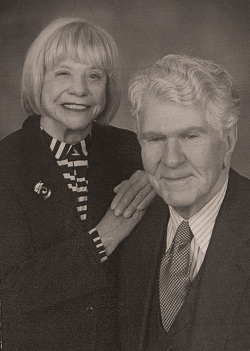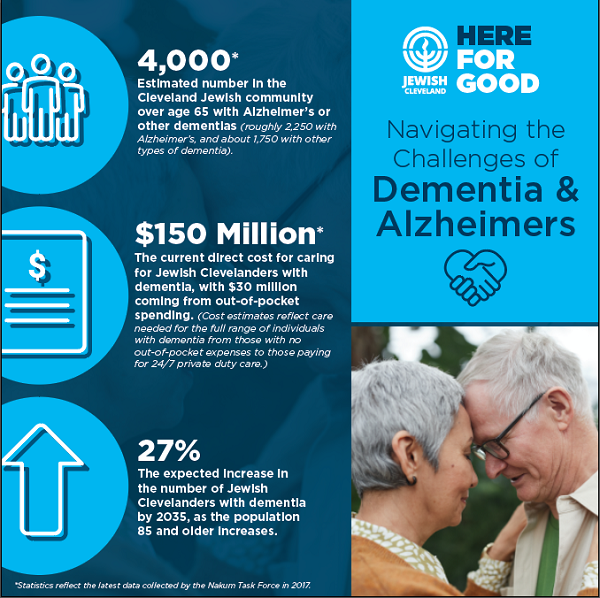Navigating Alzheimer's and Dementia Together
 When Betty became the primary caregiver for her husband, Alan, after he was diagnosed with dementia, she turned to JFSA’s Alzheimer’s Disease and Dementia Caregiver Support program for help.
When Betty became the primary caregiver for her husband, Alan, after he was diagnosed with dementia, she turned to JFSA’s Alzheimer’s Disease and Dementia Caregiver Support program for help.
The Jewish Federation initiated the Nakum Task Force to help our community take on the devastating and increasing number of community members suffering from Alzheimer’s disease and other dementias. Chaired by Kyla Epstein Schneider, the Nakum Task Force recommended increasing caregiver support, leading to a partnership between the Federation and JFSA.
The Alzheimer’s Disease and Dementia Caregiver Support program was established in 2019 and today Betty and Alan are just two of the more than 200 families who have benefitted from the program, which specializes in providing wrap–around services through JFSA’s care navigation, training and support for caregivers, and access to a dedicated geriatrician.
“Our research showed that an estimated 19% of Cleveland’s Jewish population is 65 years and older, and 29% are aged 50 to 64. We needed to respond to the growing needs of family members in the community experiencing challenges caring for their loved ones dealing with Alzheimer’s, dementia, and dementia related symptoms,” said Schneider. “Additional research found that individuals with Alzheimer’s disease and other dementias and their family caregivers are among the most vulnerable groups in Jewish Cleveland.”
“We’re very lucky to have partners in the community who could provide expertise of caring for older individuals living in a congregate care setting like Menorah Park and Montefiore, while we’re able to hone in on the specifics of people wanting to stay in their homes and giving them as much community support around them,” said Jaime Lowy, JFSA associate director for Caring At Home.
“People come to us in various ways, including referrals from family members, doctors, and other agencies,” said Hannah Thompson MGS, CMC, care navigator and dementia care coordinator with JFSA. “We’re often working on goals with the families because they’re overwhelmed, they’re stressed – and we are here to give them support. Because we are able to provide that support inside the client’s home, we are able to build the necessary trust in order for us to help them. Our care navigators create a relationship with these clients and they’re able to discuss with us some of these hardships they’re facing.”
Along with home visits, JFSA’s Pepper Pike campus includes Alyson’s Place, an outpatient medical clinic that encompasses a number of medical providers, including geriatric services through The MetroHealth System. Geriatrician Elizabeth O’Toole, MD has been working side by side with JFSA on this program, providing information to the care navigators, as well as hands–on consultations and geriatric assessments for the clients. “I am able to fully diagnose the client and have time with them,” said O’Toole, division director of palliative care at MetroHealth. “This program helps manage the care overall for the client. It helps them understand more about what care is needed and what support we can provide.”
When the pandemic hit, JFSA knew they had to continue to engage with the clients and caregivers. Being physically and socially distant wasn’t going to stop the navigators from doing their jobs. At the same time, the navigators began to see a new infusion of clients as home–bound people were seeing things that were going unnoticed in everyday life. JFSA was also hearing from concerned out–of–town relatives who were no longer able to travel to care for their loved ones.
“We’ve expanded the reach of our services because of the pandemic,” Thompson said. “For example, our caregivers were feeling very alone at home and not able to see their family members. We began a virtual caregiver support group to help them in these hard times. Moving to a virtual platform provided flexibility where we’ve been able to reach more people.”
“I didn’t know much about dementia before my husband was diagnosed,” said Betty. “JFSA enlightened me so much and our ‘care navigator’ is so supportive. This program has been extremely beneficial for us and we’re so lucky to have it here in our community.”
JFSA is already looking to the future and addressing the growing need for more support with the influx of the ’baby boomer’ generation. “As a society, we’re going to have to make many choices with how we move forward,” said O’Toole. “This wrap–around program helps to identify how we can make the biggest impact on the quality of life for these individuals,” said geriatrician Elizabeth O’Toole, MD. ”And much of that research is being done because of the support this program gets from the Federation. It’s amazing what this program has brought and what the future of the Alzheimer’s Disease and Dementia Caregiver Support program is.”
For more information, please contact Hannah Thompson at 216–408–2894.
Stories like these are made possible by the generous support of the Jewish Federation of Cleveland’s annual Campaign.
